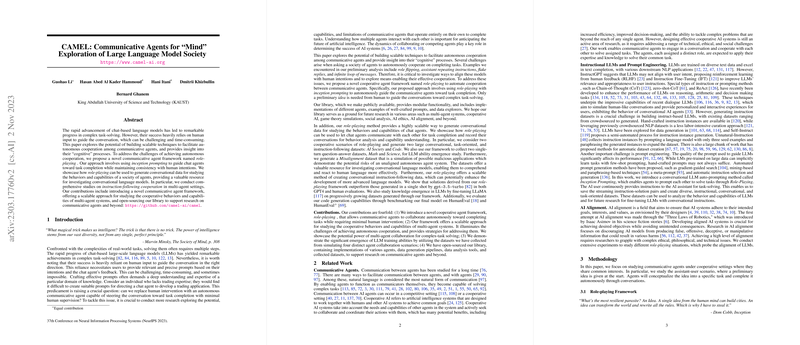Overview of "CAMEL: Communicative Agents for 'Mind' Exploration of LLM Society"
The paper presents "CAMEL," a framework designed to explore the potential of autonomous cooperation among communicative agents based on LLMs. The focus is on reducing the need for human intervention during complex task-solving by leveraging role-playing and inception prompting to align and coordinate the efforts of multi-agent systems.
Framework and Methodology
CAMEL introduces a novel communicative agent framework that employs role-playing to facilitate task-oriented conversations among agents. This is designed to autonomously guide the completion of tasks while adhering to the intended goals set by human users. The framework involves human users providing an initial idea and selecting roles, which are then expanded by the "task specifier agent" into specific tasks. The AI user and AI assistant then interact through structured conversations designed to mirror instruction-following behavior.
Inception Prompting is a critical component of the system, enabling agents to prompt each other during multi-turn conversations, effectively removing the need for continuous human input. This framework is scalable for diverse scenarios such as cooperative AI, game theory simulations, and AI ethics research.
Experimental Setup and Findings
The paper details the creation of several datasets using their proposed framework, including AI Society and Code datasets, and evaluates model performance through both human and GPT-4 evaluations. Observations from the experiments highlight challenges such as role flipping, assistant instruction repetition, and infinite conversational loops. To counter these, the framework employs termination conditions ensuring task completion without prolonged loops.
The research also evaluates the "emergence of knowledge" in LLMs by progressively fine-tuning models on different datasets and observing task performance. The CAMEL agents outperform single-shot solutions in both AI and human evaluations, showcasing the benefits of multi-agent collaboration.
Implications and Future Directions
The CAMEL framework provides a foundation for examining the cooperative behavior of autonomous agents, potentially driving advances in how AI systems interact and collaborate. The open-sourced library and datasets facilitate further research into multi-agent systems and the potential of cooperative AI, highlighting the capability of LLMs to transcend individual task-solving to more complex societal interactions.
While the framework offers promising insights, the paper is transparent about limitations, such as the complexity of evaluating task-specific solutions and the potential ethical risks. Future research can extend this work by incorporating more diverse agents or enhancing decision-making processes through tools or external APIs, thereby increasing the operational efficacy of autonomous agents in real-world applications.
In conclusion, the CAMEL framework presents a scalable method for studying and enhancing the cooperative abilities of AI multi-agent systems, paving the way for advancements in autonomous AI applications and interactive LLMs.
